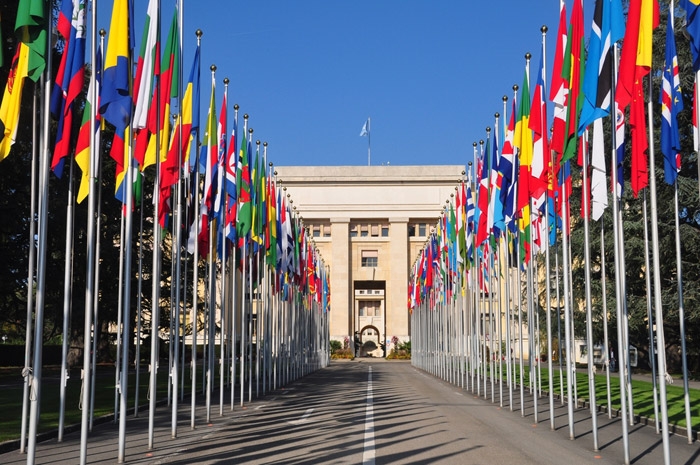Human rights defenders take center stage at the UN Forum on Business and Human Rights
 The Palace of Nations in Brussels, where the 2015 UN Forum on Business and Human Rights was held. Photo: http://bit.ly/1Irg2fN
The Palace of Nations in Brussels, where the 2015 UN Forum on Business and Human Rights was held. Photo: http://bit.ly/1Irg2fN
How do we ensure companies adhere to their human rights obligations under the UN Guiding Principles? As more and more activists are targeted by companies for speaking out, one thing is clear: protection must be part of the deal.
When Angolan investigative journalist Rafael Marques de Morais began speaking to a packed room of more than a thousand people at the annual United Nations Forum on Business and Human Rights, you could feel the audience sit up and take notice. He shared his personal story of being convicted in court this year for his work to expose corruption and human rights abuses in the diamond industry in Angola. Marques called on governments to reach out directly to human rights defenders doing the important work of exposing corruption and injustice on the ground to hear their side of the story. And their stories are many.
Each year the UN Forum on Business and Human Rights draws thousands from government, business, and civil society to Geneva. This year, the Forum focused on “tracking progress and ensuring coherence”—a logical emphasis given the voluntary nature of the UN’s Guiding Principles on Business and Human Rights (UNGPs). Now that the UNGPs have been around for a few years, how do we ensure that governments and companies actually implement them in a meaningful way? Here, civil society plays a fundamental role in promoting accountability. Unfortunately, in some contexts those willing to speak up—often in defense of the lands and resources on which they depend—risk the threat of legal action, violence, or even death.
Several brave civil society representatives spoke up at the Forum about the risks and persecution they have faced for voicing concerns about development projects. Maria Isabel Jimenez Salinas of the Asamblea Popular del Pueblo Juchiteco in Oaxaca, Mexico spoke of the threats that female human rights defenders received after raising objections to a problematic community consultation process. Alfred Brownwell of the Association of Environmental Lawyers shared a story of his narrow escape from a potentially violent encounter in Liberia while he worked to raise awareness of human rights abuses in the palm oil industry. Several audience members also shared chilling accounts of the harassment they and their families have faced as a result of their efforts to change the status quo.
Oxfam partners working on mining issues in Central America know these stories all too well. Héctor García Berríos of the Movimiento Unificado Franciso Sánchez —who attended the Forum—attests to “a campaign of terror” against local leaders opposed to mining in El Salvador which began in 2009 after the government suspended mining activities in the country. He notes that four local leaders were assassinated over just six months in 2009. In Guatemala, lawyer Petro Rafael Maldonado Flores of the Centro de Acción Legal-Ambiental y Social de Guatemala has personally defended 125 human rights activists who opposed a silver mine located in San Rafael las Flores. He claims that the company, Minera San Rafael S.A., hired a former military officer to work to criminalize opposition to the mining project.
Oxfam and seven partner organizations working in Latin America released a communiqué around the Forum calling on the UN Working Group on Human Rights and Transnational Corporations and Other Business Enterprises to collaborate with states to end criminalization of human rights defenders around extractive industry projects.
Governments should protect the right to protest and address criminalization of protest in their national action plans on business and human rights in their UNGP implementation. Governments and companies should also develop policies that enable local communities the opportunity to give or withhold their consent for oil, gas, and mining projects. Communities must be included as participants in decision making around these projects very early and in an ongoing manner so that governments and companies can identify and address local concerns before social conflict bubbles up.
It’s encouraging that human rights defenders like Marquez have found some space to speak truth to power at the UN. However, they remain at grave risk when doing this on a daily basis in their home countries. There’s no hope for real change in the arena of business and human rights unless protection of human rights defenders is part of the deal.